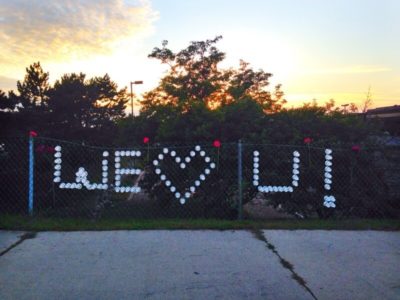The phone was already in my hand when it started vibrating, and I picked up on the first ring. It was Shannon, calling with the news that her friend Rachael committed suicide. Rachael was a girl I never really knew, but many of my high school friends knew her.
For Shannon and I both, “best friend” had always been a bit of an ambiguous term. We each had our own friend groups and people we hung out with more than each other. I’d never known what made someone a best friend, exactly. Were the people you hung out with the most your best friends? What about your oldest friends? In many ways, my best friend was Shannon. She was the only person I truly felt comfortable telling everything, the only one who seemed to understand every insecurity I ever had, no matter how irrational.
So in one sense Shannon and I were best friends, but in another sense, Rachael was hers. I’d never even met Rachael myself; in the Venn diagram of my and Shannon’s lives, she lay in the isolated sliver that belonged to Shannon alone.
Shannon proceeded to tell me the story of how she found out. The details don’t matter, except that Rachael’s suicide was something nobody could’ve predicted. Shannon was remarkably composed about it; her voice shook, but she told me the whole story fairly calmly.
I said all the things I was supposed to. I apologized. I said she could talk to me whenever. I tried to be apologetic while still treating her like a human being capable of conversation, not just a fragile flower. Then, just like that, the phone call was over and I went to meet my friends for dinner.
Before I even entered the dining hall, as I was standing and waiting in line, I listened and watched the crowds milling around. I didn’t hear anything in particular, just the general buzz of conversation, but I suddenly felt goose bumps covering my arms. It’s hard to articulate what was so surreal about it. There was just something weird about seeing life proceeding as normal.
As I ate with my friends, we exchanged jokes. Sometimes I was the one telling them. But my body was on autopilot, saying all the things I usually would and responding the way I always do. I was maybe a little quieter than usual, but not noticeably so. Every time I heard a joke, it felt wrong, but I automatically laughed at it.
The kind of sadness I felt that day was a very different kind of sadness than I’d ever felt before. It wasn’t like the near-nauseating paranoia about upcoming deadlines. I didn’t feel the overpowering throb of rejection, or the claustrophobic desire to shut everything out of my mind. I just felt this creeping darkness all around me. It was a sort of secondhand grief, the kind of empathetic sadness that you feel when something terrible happens that deeply affects people close to you without affecting you.
At first I felt this sense of powerlessness over my inability to help Shannon. There was no show of sympathy that could really lessen a friend’s pain in a situation like this one. Maybe it was something more selfish; maybe I was somehow frustrated at my inability to truly grieve for someone I didn’t know well. I think we followed each other on social media, but she was always just a friend of a friend.
As the week went on, I heard about events going on to support Rachael. There was a viewing that many of my friends were returning home to attend. I saw countless Facebook posts. I was in an odd position, feeling obligated to say something but not really having anything profound to say. The tough thing about secondhand grief is that you’re never sure where you fit in. Is it appropriate to attend a viewing? Is it okay to make a Facebook post? It’s an area where there’s no common etiquette.
A couple days later, a girl I knew from high school made an outrageous post on Facebook that attempted to glean some artificial lesson from Rachael’s suicide—as if her depression was meant to show us that we all need to show our love and offer our support to people in need, as if Shannon and all of Rachael’s other friends weren’t good enough to save her. Shannon and I both furiously commented, together pointing out the offensiveness of the girl’s message. Before long, I was receiving texts from people thanking me for intervening.
The fact is, if that girl on Facebook hadn’t existed I would’ve been stuck in the same spot, close to what happened while still ultimately distanced. In fact, I felt a little guilty about the responses I got from the Facebook rant. The grief I felt for Rachael mostly came from knowing Shannon, not from knowing Rachael.
I eventually realized that sometimes it’s okay not to fit in. Sometimes it’s important not to force yourself into someone else’s grief. Sometimes you have to just sit and quietly be there for someone.
I’ve accepted that there’s no way I can go back and get to know Rachael now, but I’ll continue to get peeks at her personality through commemorative Instagram posts and shared memories. Maybe I’ll never be able to properly grieve for her, but what matters is that she had a wealth of people who cared about her. I’ll remember that every time I look at Shannon’s arm and see the tattoo that reads “9.9.14.”



















